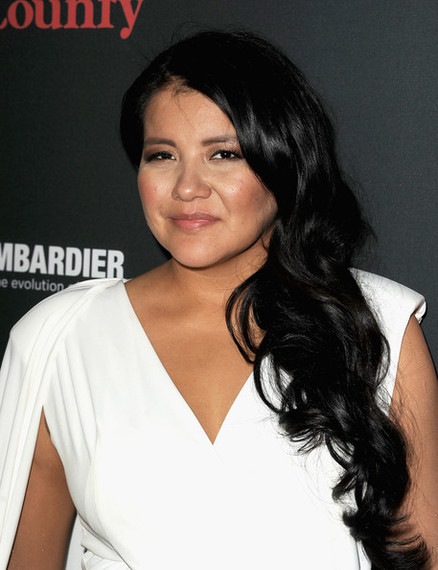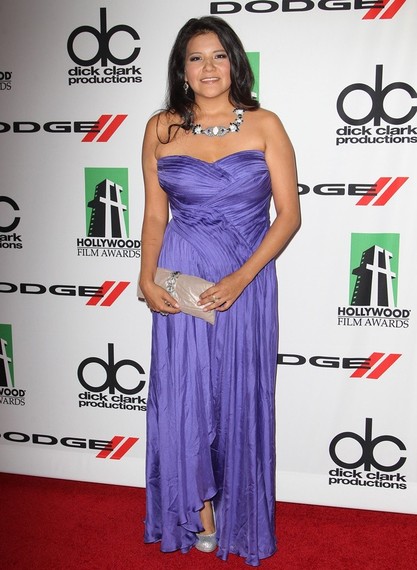A body believed to be that of missing actress Misty Upham has been found in the Seattle area, police said on Thursday.
I first interviewed Misty Upham a few months ago, and it ended eerily. Out of the more than at least 1,000 interviews I've conducted, our three hour-long conversations were uniquely unshakeable.
For a freelance writer based in Montana, Upham's connection to Hollywood seemed like a good story. After all, I watched as she cultivated a formidable following in 2013, with roles in "Jimmy P: Psychotherapy of a Plains Indian" and "August: Osage County". Her success a function of something intrinsic to her personality, some combination of curiosity, self-confidence, sociability, and energy.
"I always knew when I left the reservation at age 12 that something was going to happen, if I followed my instincts," said Upham, on a mid-summer afternoon. "I knew that if I didn't look toward things that didn't feel right, I could do something. When I think back to that girl with no purpose or no direction, no support, I still had that special knowing in myself, and a sense of what I was meant to be. You can question youth, and ask, 'How can you believe in something when so young?' But I'm grateful in the faith."
A Blackfeet Native and direct descendant of Chief HeavyRunner, Upham was born on the Blackfeet reservation. At age four, she moved to Billings, where her father went to Eastern Montana University while working at Taco Bell, Pizza Hut, and K-Mart; later they moved to Fort Belknap and then back to Browning. "I come from one of the poorest families on the Blackfeet reservation," said Upham. "There was lots of violence, and I felt doomed there."
That's where the conversation first turned dark, Misty's recollections of sexual violence too graphic to forget and not part of that particular article's intended focus.
At 12, Upham said she befriended a girl named Alicia, who was an aspiring actor. Alicia auditioned for movie parts and excitedly talked of casting calls and acting coaches. "She had red, curly hair, and she reminded me of life off the reservation. She was in Cut Bank, 30 miles away. It felt good to have some normalcy. Her dad was a bodyguard for the New Kids on the Block. I was starry-eyed."
Once Upham decided that she wanted to live the dream, she convinced her father, Charles, to take her to Seattle, where she started attending acting workshops. "I needed to lose the reservation. I needed to leave. My idea was to go to the nearest city and go to the first theatre I could find. I would watch movies, take breaks, and eat. At 13, I stopped being suicidal, and I found something to live for."
At first, she was terrified by the prospect of performing in front of others in a class setting, and she even feared talking to others. "The teacher said, 'I see something special in you. I see hunger, determination, a survivor.' I found my personal power and special something. I remember going home from the workshop, shutting the door, and crying. It was something that I could depend on, and I could live for."
Her break came shortly after high school -- in a showcase at Seattle's Nippon Kan Theatre. Within a month, Upham had an agent and her opening movie role, in Chris Eyre's 2002 drama "Skins," set on a South Dakota reservation.
Continuous work in television and movies followed, including a role in Rick Stevenson's 2006 comedy "Expiration Date," filmed in Seattle. Upham ended up in Los Angeles working as a housecleaner, sleeping in and living out of her car in between eight-hour shifts of scrubbing her boss's floors. "Many working actors live with uncertainty," said Upham.
She landed the role of Johnna in "August: Osage County," a young Native American woman who answers an ad for a housekeeper and caregiver for a hot and bothered matriarch played by Meryl Streep. "I wanted to bring the humanity and dignity of this woman to the big screen," said Upham.
Two months later, she was staying in a Cut Bank, Montana hotel preparing for the filming of "Jimmy P: Psychotherapy of a Plains Indian," a production based on the real-life of a Blackfeet Indian and World War II veteran. "It was a weird feeling," said Upham. "There's Benicio (Del Toro) and he's practicing square dancing -- in the same library I went to as a girl. It reminded me of why it's important to go after your dreams."
Returning to film "Jimmy P." in Montana piercingly reminded Upham of all the traumatic things that happened to her as a young girl, she said.
But she pressed on, chasing her dreams.
The chase paid off when the 32-year-old walked the red carpet at the Cannes Film Festival for "Jimmy P. "and received praise for the role of Johnna in "August: Osage County." Everything her characters ever felt or were feeling seemed written indelibly on her face. Consequently, audiences took note of a charismatic person who infected them with her emotions.
Upham said that she planned to move back and forth among all the different niches that the acting profession has to offer, not just parts that designated her by ethnicity. She just finished filming "Crawlspace" with Jennifer Aniston. As an actress, she was not the kind of person who wanted to twist your arm. She was more of an energy broker, sharing and trading what she felt.
"You don't have to say a word or make an expression," said Upham. "You project energy and that's what reaches people across the world."
Upham was grateful for her success, and, sadly, always haunted by it. She hoped her example would have allowed other Native Americans to see themselves in a new light. Upham said that young people on reservations are a lot more sensitive to their environment than they may seem. She said that she envisioned returning to the reservations of Montana to foster an artistic epidemic to counter the prevailing epidemics of poverty and pessimism.
"I know how dark it is on the reservation," said Upham. "Anger is all they have. I want to bring art to the reservation and the chance for young people to respect themselves in a safe place. I want to give them something -- and that something will save some lives."
There was much more to our conversation. There was talk of suicide, depression, anxiety, and self-mutilation. There was unabashed agony. There were vague hints and patent warnings that her time on this earth would be short. There were pages and pages of notes that have troubled me for months.
But there was also beauty, kindness, hope, and inspiration in her words.
And that's what I will choose to remember of Misty Upham.


